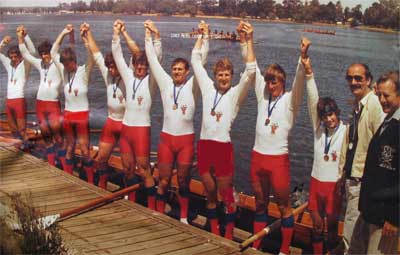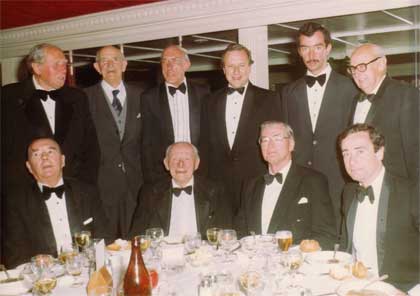History of Mercantile Rowing Club
Table of Contents
Chapters
- The River Yarra
- Early Rowing in Victoria
- The Beginnings (1880-1890)
- Mercantile in the Nineties (1890-1900)
- Sloan, Ivens and Fluctuating Fortunes (1900-1910)
- Dark Days and New Dawn (1910-1920)
- Years of Mixed Success (1920-1930)
- Through the Thirties (1930-1939)
- The Struggle for Survival (1939-1946)
- Building for Success (1946-1950)
- Mercantile to the Melbourne Olympics (1950-1956)
- Rowing to Rome (1956-1960)
- A Pink Cloud on the Horizon (1960-1965)
- The Storm and its Passing (1965-1966)
- A Clear Light Blue Sky (1966-1968)
- High Noon (1968-1970)
- A New Challenge (1970-1973)
- Fire and the Second Building Project (1973)
- Winds of Change (1973-1976)
- The Close of the Century (1976-1980)
- The Base for Success (1980-1984)
- Success (1984-1988)
- Oarsome Foursome (1988-1992)
- A Boathouse for the Best (1992-1996)
- The Rise of the Professional Coach (1996-2000)
- Golden Girls (2000-2005)
Appendices
21. The Base for Success (1980-84)
Chapter Twenty-One page 1 2 3 4 5
1982-83 Season
This season continued well with the club finishing as the Victorian Champion Club, with Lightweight and Junior Premierships. Further many more members represented their State and country thus cementing the Club as a dominant force within the sport in Australia.
The rowing season of saw great progress in the senior and under 19 performances of Mercantile oarsmen. The first significant step forward was the appointment of David Palfreyman as the heavyweight senior coach. The way that Mercantile heavyweight rowers applied themselves was to change to a longer arc in the water complemented by a weights program designed to strengthen what was a young and physically talented squad.

1983 Champion Eight
Bow: Stuart Moreton, 2: Tasso Paxinos, 3: Mark Doyle, 4: Glenn Deag, 5: Ian Belot, 6: Neil Myers, 7: Sam Patten, Str: David Doyle, Cox: Graham Barns, Cch: David Palfreyman, VRA President: Hubert Frederico
Sam Patten saw the light and returned from a season with the University club. Seats in the top eight were competitive where some members from the drought breaking champion senior eight from the previous season missed out on this boat.
As with all great institutions, Mercantile can make mistakes. Ion Popa was omitted from the eight and subsequently transferred to the Banks Rowing Club. Ion was selected in the 1983 Australian eight, won a bronze medal in the Olympics in 1984, a gold medal at 1986 World Championships as well as rowing in the 1988 Olympic eight. The prestigious "Cliff" award was presented at the end the 1983 season to those persons who unwittingly boosted Ion's rowing career.
The main challenge to Mercantile taking the mantel of the dominant heavyweight force in Victorian rowing would come from the Banks Rowing Club who had brought a former Victorian, national and Olympic coach in Chris Dane out of retirement. It was no surprise that numerous experienced elite heavyweights from the University transferred to Banks. The Banks senior eight also saw the pairing again of Brian Richardson (stroke) and Noel Donaldson (cox).
In late December 1982 the two eights raced for the Victorian state title with Mercantile winning by four lengths after being three boat lengths ahead at the 1,000 metre mark. Many of the ex-university rowers in the Banks squad retired after this race. Noel Donaldson immediately resumed his existing role as Mercantile FISA junior coach and was never tempted again to move to the dark side.
Some three years later, Brian Richardson would again join Mercantile and become one of our most successful and influential heavyweight coaches. It was also known that Brian and Noel did not feel comfortable nor competitive when they were wearing pink rowing suits.
Mercantile lightweight squads continued to make great progress under the studious coaching of Marty Owen assisted by Tim Frederico and John Leeming. The highlight of the season was the win by our young and relatively inexperienced coxless four at the Victorian state title in January 1983 against seasoned international combinations beating the Melbourne University boat for the first time in 8 years. The crew comprised Doug Scown, Greg Pechan, Derek Mollison and Alan Borger. Other lightweight club squad rowers won many domestic regatta races plus numerous Victorian state titles during the 1982-83 season. These included Andrew Douglas who took out the Captain's trophy.
Joe Fazio held the club youth squad together while Phil Ainsworth, Nick Newton and Andy Guerin inspired our many new school leaver recruits to the winning way. Vic Ronai-Horvath had a great season with the novice squad as well as leading them to sharpen their social skills before, during and after the Dimboola regatta. He was awarded the Cooper Trophy for his coaching work but perhaps not the Dimboola Regatta work.
Having had some success at the three national selection trials held prior to the Nationals and Kings Cup Regatta (Perth April 1984), Mercantile rowers were geared for a strong performance at these final championships of 1983-84. The lightweight squad performed well in open age competition making semi finals of the pairs and the coxless four final. As a consequence Derek Mollison, Joe Joyce, Alan Borger and Tony Inglis were named as the Australian under 23 lightweight coxless four with Marty Owen named as coach.
The only quality performance in the heavyweight elite men's events was a third place in the coxed four by three Mercantile rowers Ian Belot, Sam Patten and Neil Myers plus Jim Lowe (Banks and ex MUBC).
The composite Victorian youth eight won the men's under 23 championship and the all Mercantile men's junior coxed four finished a close third place in a quality field. This was a sign of things to come as Mercantile crews would win this junior event for the next consecutive four years beginning in 1984.
The interstate series of 1983 featured some great racing for Mercantile rowers.The Victorian Kings Cup eight featured seven Mercantile rowers plus the cox with Dave Palfreyman as coach. They led the race until the last 250 metres when they were overhauled and narrowly beaten by the more experienced South Australian eight. The other member of the Mercantile senior eight Tasso Paxinos, rowed in the state youth boat which was likewise narrowly beaten by South Australia in similar race style. This crew was coached by John Harry, a Mercantile member now coaching at MUBC. The women's state heavyweight four which won comfortably was also coached by David Palfreyman. David also coached the winning schoolboy eight of Australia with his Wesley crew who were beaten the previous week by Paul McGann's Brighton Grammar (stroked by Andrew Cooper) in the APS Head of the River.
David Doyle and Sam Patten were selected in the Australian eight for the world championships held in Duisburg, West Germany. This crew took out the bronze medal in a great final row. This was the first Australian eight to medal since the 1968 Mexico Olympic silver medal medal. Graham Barns was selected as cox of the lightweight eight which surprised everyone, themselves included, to win the silver medal in this event. 1983 was the first year that men's lightweight rowing was officially sanctioned by FISA as a world championship. Glenn Deag and Mark Doyle joined the Mercantile lightweights in the Australian under 23 team to complete a Trans Tasman tour.
Numerous varieties of social functions were either maintained or invented to foster club spirit or, most importantly, to raise monies for the club. One such fundraising invention, "The Gala", was the brainchild of Marty O'Halloran and the wild Bill Canty. Basically these functions were based on high volumes of young people, low entry charge and cheaply supplied drinks, thus creating high profits on small margins on high volumes.
Two such Galas were held in 1983 and approximately 400 people attended both functions and a great deal of money was raised.
The 1984 function featured our resident member rock band "The Huxton Creepers" who in front of some 420 excited rowers and their friends turned up their amplifiers to maximum and melted down the club's main electrical switchbox. Fortunately two club lightweights who were A grade electricians, cabled our power supply to the next door clubhouse (which was empty) and the function continued into the early hours of the next morning. These functions were both great fun and profitable. However activities of many senior club officials and future international rowers at the Galas must be suppressed due to the laws of libel.
The season finished with the retirement of the great Jim Sprigg as President and his appointment as Patron. The Annual Meeting was a grand affair with all members saddened by his retirement. Doug Brooke was also appointed life member of the Club for a lifetime of support of rowing and the Club.

1983 Testimonial Dinner For Jim Sprigg
Back row - Lance Hill, Doug Brooke, Bill Bradshaw, Hubert Frederico, Phil Ainsworth, Norm Cairnes. Front row - Deane Morgan, Jim Sprigg, Bob Aitken, Andrew Guerin.
